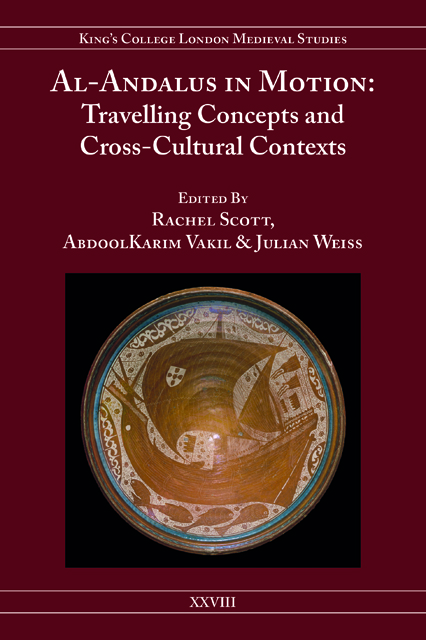Book contents
- Frontmatter
- Contents
- List of Illustrations
- Acknowledgements
- Notes on Contributors
- Part I Departure Points
- Part II Translating Al-Andalus: Travelling across Languages
- Part III (Re)Visions of Al-Andalus in Diaspora and Exile
- Part IV Andalusi Space as Node and Utopia: Europe, Islam, Empire
- Part V Al-Andalus and the Politics of Religious Identity
- Part VI Legacies, Landscapes and ‘Travel Buildings’
- Epilogue
- Index
7 - Andalusi Utopia and Muslim Modernity in Late Nineteenth-Century Russia: Ismail Gasprinskii’s Epistolary Novel Dar al-Rahat
Published online by Cambridge University Press: 02 June 2023
- Frontmatter
- Contents
- List of Illustrations
- Acknowledgements
- Notes on Contributors
- Part I Departure Points
- Part II Translating Al-Andalus: Travelling across Languages
- Part III (Re)Visions of Al-Andalus in Diaspora and Exile
- Part IV Andalusi Space as Node and Utopia: Europe, Islam, Empire
- Part V Al-Andalus and the Politics of Religious Identity
- Part VI Legacies, Landscapes and ‘Travel Buildings’
- Epilogue
- Index
Summary
Between renewal and reform
The second half of the nineteenth century witnessed major debates over the idea of modernising Russia's Muslim community. These debates were part of what came to be known as Jadidism, a movement for reforming the traditional system of Islamic education. Modernising Muslims introduced into the curricula of religious schools (madrasas) secular subjects like geography, natural sciences and the Russian language. Though the ‘new method’ (usul-i jadid) was originally developed to teach language phonetically, it came to signify a broader and more radical restructuring of traditional Islamic education and the cultural reform of Muslim life in general. The ‘new method’ offered Russian Muslims an alternative to the special schools created for the ethnically non-Russian population, and gave them a sense of ownership over their education, enabling them to balance their desire to preserve their religious identity with ambitions to create a new type of culture. Jadidism, then, became a broad national-cultural and political movement of mainly Turkic-speaking Muslims of the late Russian Empire.
Like other ‘non-Western’ national and religious movements of the modern era, this movement has been subject to conflicting interpretations. Jadidism was far from monolithic, and recent scholarship has questioned its status as a unique explanatory paradigm for Russian Islam.1 To simplify what is a complex issue, debate turns upon the tension within Jadidism between renaissance and renewal (islah), with its doctrines of pious renovation (tajdid), and the idea of bid’a, or illegitimate innovation that threatens orthodoxy. For proponents of islah, tajdid reconciled modernity with Islamic teaching and respect for authority, especially as regards Islamic law (fiqh). Unlike the Christian Reformation, this reform movement did not challenge received dogma or theological doctrine (with some important nineteenth-century exceptions, such as the Babid and Baha’i movement in Iran and Ahmadiyya in India). At the same time, it tried to create space for socio-political ideas of Western origin: notions of intellectual progress, political liberty and institutional democracy, including ideas of nationhood – though not in the nineteenth-century European sense of nation-state, but as Ummah, the nation of all Muslims, united on a religious basis as a collective political subject. The tension between conservatism and reform may have limited radical modernisation in some quarters, but even so, many Islamic reformers were personally or ideologically connected to anti-colonial forces and promoted a modernised Islam as a challenge to Europe's colonial dominance and Western hegemony in general.
- Type
- Chapter
- Information
- Al-Andalus in MotionTravelling Concepts and Cross-Cultural Contexts, pp. 179 - 204Publisher: Boydell & BrewerPrint publication year: 2021



